If you’ve ever struggled with a WordPress problem, you know how frustrating it can be.
But here’s the thing: in the open-source world of WordPress, how you ask for help can make a huge difference. It can mean the difference between quick, helpful answers and crickets.
We’ve seen both sides of this. We’ve asked for help ourselves, and we’ve answered countless questions from our readers. Through this experience, we’ve learned what works and what doesn’t when seeking WordPress support.
We’ll share these insights with you in this guide. You’ll learn where to ask your questions, what information to include, and how to phrase your requests to get the best help possible.
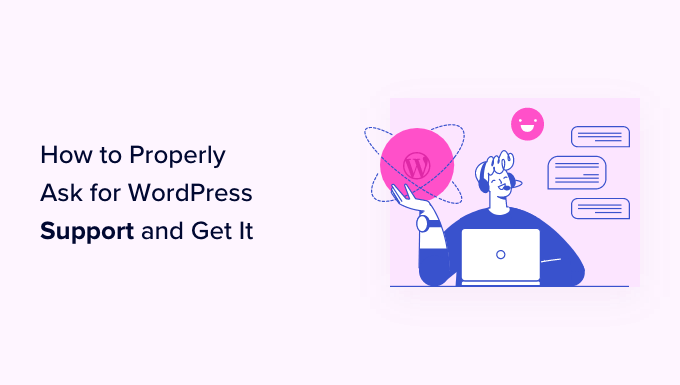
What You Should Know About Support in WordPress
Before asking for WordPress support or help with a specific plugin or theme, it’s important to understand that WordPress is an open-source community project.
This means that WordPress is free, and so are many of the themes and plugins that you use with it. Developers can create their own WordPress plugins and themes and freely share them on the official WordPress repository.
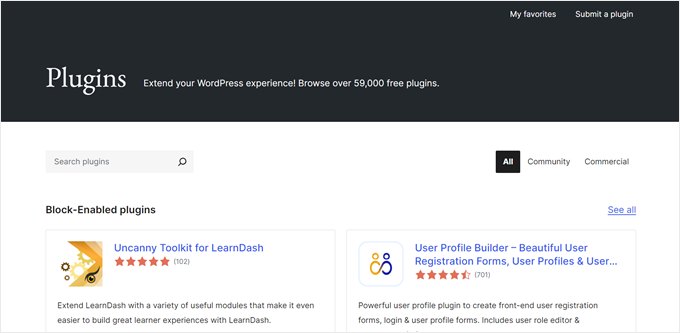
Many of these developers are not part of the WordPress core team but simply fellow enthusiastic WordPress users. They don’t sell their work and are happy to help you out with a few small problems.
We go into more detail on why WordPress doesn’t natively offer direct support services in our article on how to contact WordPress support.
Also, since a lot of WordPress developers are not compensated for sharing their work and giving assistance, it’s important to be respectful and thankful when asking for their support.
For example, you might post a positive review on their plugin, recommend their theme to a coworker, or thank them publicly on social media where other WordPress users can see it.
We also recommend leaving a review on any plugins or themes featured in our WPBeginner Solution Center. This way, fellow WPBeginner readers can benefit from your testimonials and see which plugin or theme developers are most helpful.
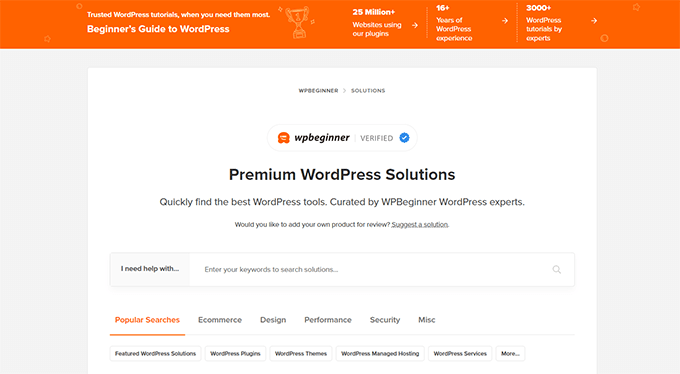
In this guide, we will cover all the different ways that you can get WordPress support for your WordPress site. We recommend starting with the first option and working your way through each method.
However, If you prefer to jump straight to a particular step, then you can use the links below:
- Option 1: Do Your Own Research Before Asking for WordPress Support
- Option 2: Try Troubleshooting the Problem First
- Option 3: Reach out to Plugin/Theme Developer on WordPress.org
- Option 4: Ask the WordPress Community
- Option 5: Reach Out Directly to Premium Plugin/Theme's Support Team
- Option 6: Ask for WordPress Hosting Support
- Option 7: If All Else Fails, Get Professional WordPress Help
Option 1: Do Your Own Research Before Asking for WordPress Support
When you have a problem with a theme or plugin, you may be tempted to contact the developer for help right away.
Before taking this step, it’s a good idea to check whether your question has already been answered. Since you are on the WPBeginner website, you are already in the right place to get those answers. WPBeginner is the largest free WordPress resource site for beginners.
Simply use the search bar at the top of the page and type in a few words that describe the problem you are having.
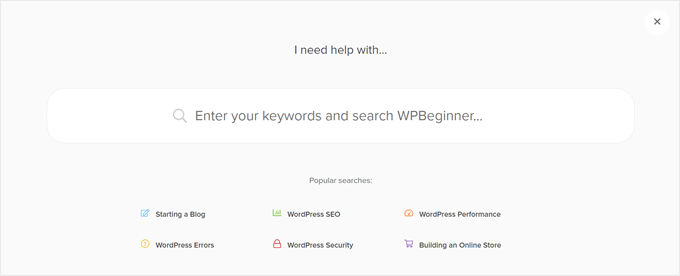
If the issue is with a particular theme or plugin, then it’s a good idea to type this theme or plugin’s name, followed by some information about the problem.
If you are getting a WordPress error, then it’s always worth pasting the error message into the WPBeginner search bar.
For example, searching for ‘Error Establishing a Database Connection’ will bring up a complete guide to fixing the database connection error.
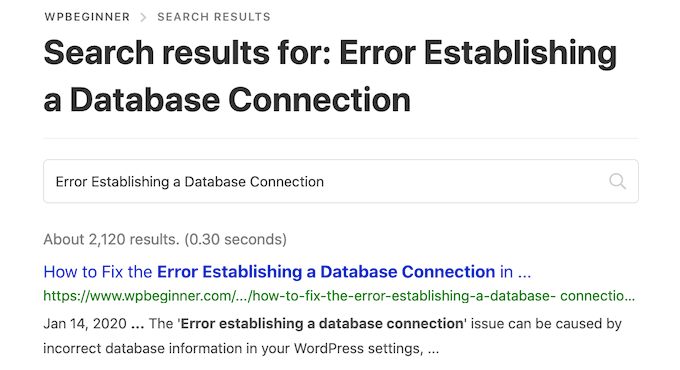
Another option is to use your favorite search engine and just add ‘wpbeginner’ to your search.
Some of the more popular themes and WordPress plugins also have their own websites, blogs, FAQs, and other types of online documentation.
These resources often contain information that can help you understand the issue and perhaps even fix it yourself.
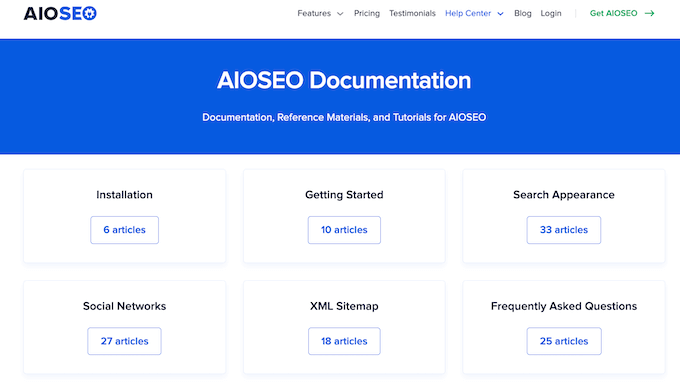
By taking these simple steps, you can fix your problems without even contacting the developer.
Many plugins and themes are passion projects that developers work on in their spare time. With that in mind, they may not reply to your question straight away.
Option 2: Try Troubleshooting the Problem First
Before asking for help, it’s a good idea to try some simple fixes yourself.
You can give it a try with our beginner’s guide on how to troubleshoot the most common WordPress errors.
Even if you don’t manage to fix the problem, you’ll often learn more about what’s going wrong. You can then share this information with the theme or plugin’s author. This will help them better understand the problem and hopefully fix it faster.
At the very least, it shows that you tried to solve the problem first. This encourages the developer to take your support request seriously.
Option 3: Reach out to Plugin/Theme Developer on WordPress.org
If you are still having problems, then the next step is contacting the plugin or theme’s author.
The good news is that every plugin and theme in the official WordPress repository has its own support forum.
To find the forum for a particular plugin, go to that plugin’s page in the official WordPress repository. You can then click on the ‘Support’ tab to see that plugin’s support forum.
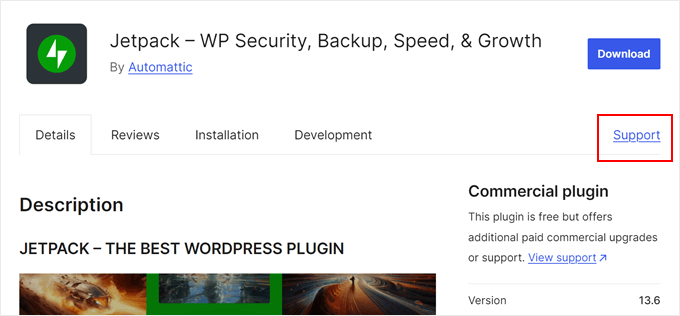
Looking for help with a free WordPress theme?
Then, simply head over to that theme’s page in the WordPress theme repository. Here, you need to click on the ‘View support forum’ button.
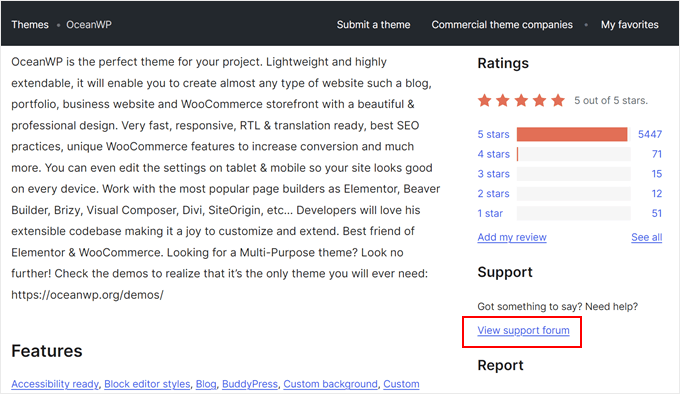
Before you can post on the support forums, you will need to log in to your WordPress.org account.
If you’re not currently logged in, then simply click on ‘Log in to Create a Topic.’ You can then sign in to your account.
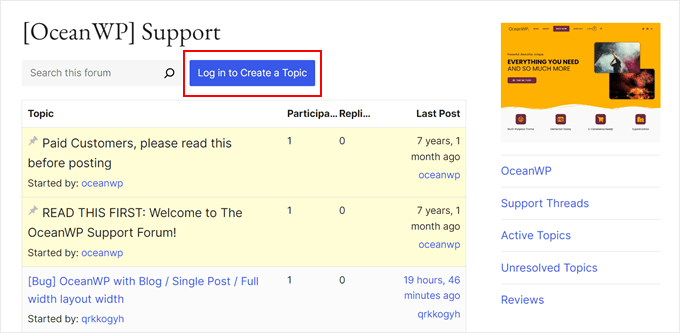
Once you’ve done that, you can start a new thread or reply to someone else’s post.
When posting to support forums, it’s important to remember that you are asking an expert to answer your questions for free.
With that in mind, always try to be respectful, clear, and concise.
It also helps to explain all the steps you’ve already taken to try and solve the problem yourself. This shows that you don’t just expect other people to do all the hard work for you.
It can also convince the plugin or theme author that this is a serious problem and not just a user error. Developers want their users to have a good experience with their plugins or themes. If they suspect that you have found a serious bug or error, they’ll want to solve it right away.
To help you make a good first impression, here’s a template that you can use when posting to the WordPress support forums:
Thank you for creating your awesome XYZ plugin/theme. For some reason, I can’t get it to work and I would really appreciate it if you can help me with it.
I’m using WordPress version:
Plugin/theme version:
I did this:
I expected the plugin/theme to do this:
Instead it did this: (Include any error messages here)
I’m using this hosting provider:
I have tried the following solutions:
I have tried to recreate the issue in the following web browsers:
Thank you for taking your time out to help. I really appreciate it.
Here, you are providing the developer with information that can help them understand the problem and potentially even suggest a fix.
Occasionally, the author might ask for more details, such as your domain name or a list of the plugins or themes you’ve installed. However, by providing all the information above, you are already off to a good start.
Once you’ve created the support thread, you may want to reach out to the developer directly. For example, you could send them a tweet or an email. This may help you get a faster response, particularly if the author doesn’t regularly check their support forum.
If you do contact the developer directly, then make sure you provide a link to your support thread. It’s also a good idea to send them one message only.
If you tweet the plugin’s author, send them an email, and message them on Facebook, then you are just going to annoy them.
This will only hurt your chances of getting a helpful response.
You should also keep in mind that the plugin or theme author may have a busy work schedule. They might also be in a completely different time zone to you. With that in mind, you may need to wait for a response.
Option 4: Ask the WordPress Community
There is always a chance that other WordPress users have experienced the exact same problem and found a fix. These people could potentially help you solve the issue without you having to rely on any kind of professional support.
The WPBeginner Engage Facebook group is the best place to get support from other WordPress users and experts. With over 97,000 members, WPBeginner Engage is the largest and fastest-growing WordPress group for non-techies and beginners on Facebook.
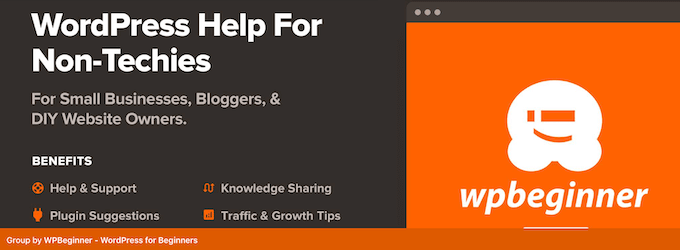
Our team of WordPress experts also actively participates in the group to make sure members get all of their questions answered.
Option 5: Reach Out Directly to Premium Plugin/Theme’s Support Team
If you have paid for a premium plugin or theme, then you can usually get professional support from the people who created that product.
Most companies have special support areas or support channels, such as help desk software and live chat.
For example, WPForms, MonsterInsights, and AIOSEO all have special support areas.
Every company has their own rules for getting support.
When you have a question, it’s important to post it in the right place. For example, if a company asks you to contact them using a particular email address, then don’t send them a message on Twitter.
If you don’t follow the rules, then the support team may not see your question, and you won’t get the help you need.
If you are not sure how to ask for help, then try visiting the plugin or theme’s website. Here, look for any links that show Support, Help Center, Contact Us, or similar.
Many websites and blogs include support links in their footers.
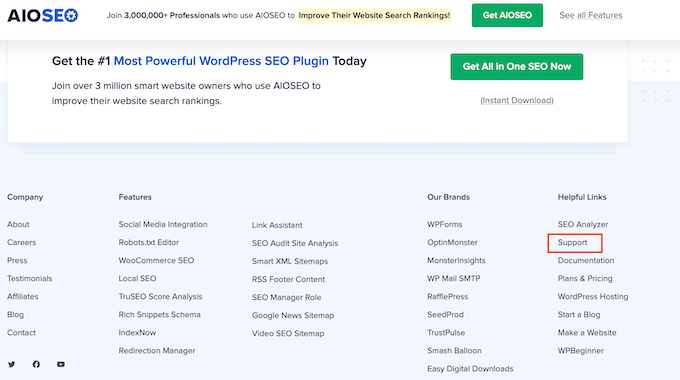
You may also find these links in the website’s header.
In the following image, you can see that All in One SEO has a ‘Help Center’ link at the very top of the page.
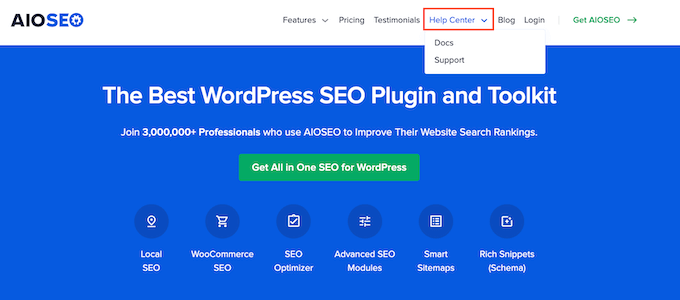
After clicking on this link, you may be asked for a username and password.
This is usually the information you provided when purchasing this theme or plugin.

If you downloaded the commercial plugin or theme from an unofficial third party, then you won’t have access to professional support.
With this in mind, you should always buy your commercial themes and plugins from an official source. For more information, please see our guide on why you should avoid nulled WordPress themes and plugins.
When talking to a professional support team, you should still follow the guidelines we covered above. Just because you paid for a product doesn’t mean you get to be rude.
It’s also a good idea to provide as much information as possible. You can even take a screenshot showing the problem. This information will help the support team understand your problem and solve it as quickly as possible.
Option 6: Ask for WordPress Hosting Support
Maybe your problem is not with a plugin or theme but your website in general. If you tried resolving the issue but failed, then you may want to check with your WordPress hosting provider to see what’s going on.
One thing you can do is check out the hosting provider’s documentation. This is where they have answered many frequently asked questions about hosting, domains, SSL, and so on.
If you use Bluehost, then you can just visit their knowledge base and type down a topic related to your issue. The page will then show the most relevant results.
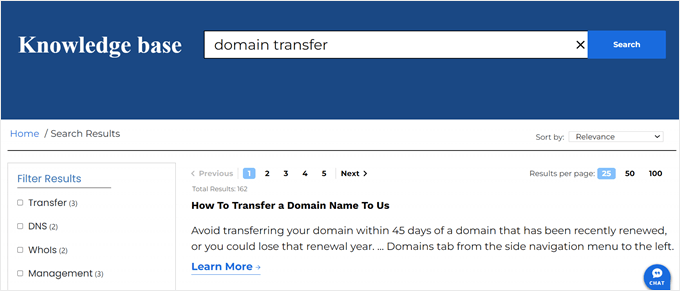
If that doesn’t work, WordPress hosting companies usually have a 24/7 live chat service that you can contact. They will be happy to help you with any questions that come up and look into what’s happening with your hosting and website.
If you use Bluehost, then you can simply log in to your hosting account and click on the Live Chat button in the bottom-right corner of the page to message a customer support agent. In our experience, they usually reply in less than 5 minutes.
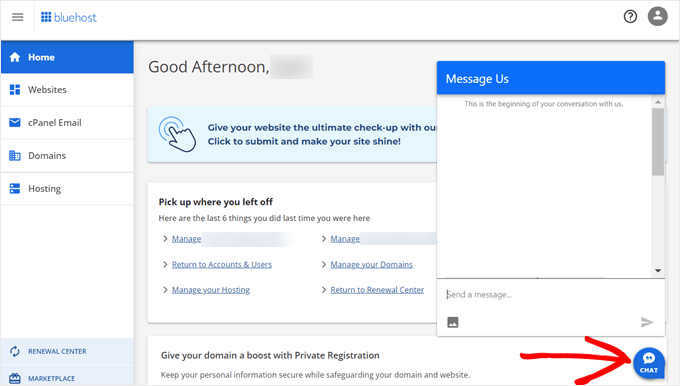
Option 7: If All Else Fails, Get Professional WordPress Help
At times, the problem on your WordPress site can be too difficult for you to solve on your own. If the issue stays unresolved, you might risk compromising your website. For online business owners, this can mean lost revenue and customers.
If the methods we discussed earlier don’t help, it may be worth considering to ask for professional help.
Many professional WordPress developers and agencies will be happy to give you premium assistance. Since they have a lot of technical knowledge, they will be much more equipped to solve your problem.
Not sure who to hire? WPBeginner Pro Services is one of the best WordPress support agencies that can help you with various problems on your site, from hacked site repair and maintenance to custom website design. Plus, we offer straightforward, affordable pricing.

Simply visit the Services page and choose a plan that suits your needs, and our team of WordPress experts will handle the rest.
We hope this article helped you learn how to properly ask for WordPress support and get it. You can also check out our guide on how to hire virtual assistants for your WordPress site and the best shared inbox tools to manage team emails.
If you liked this article, then please subscribe to our YouTube Channel for WordPress video tutorials. You can also find us on Twitter and Facebook.





Have a question or suggestion? Please leave a comment to start the discussion.